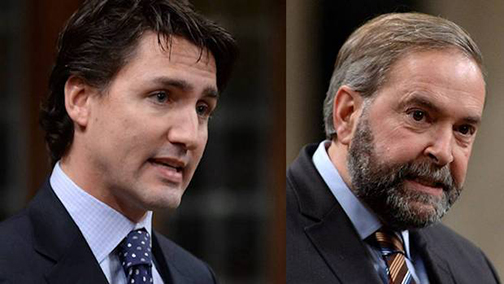

NDP, Liberals step up federal election timetable despite October 2015 date
KATHRYN BLAZE CARLSON
Despite repeated Conservative assurances the next federal election will be in October, opposition parties remain skeptical and are preparing for an early campaign.
Prime Minister Stephen Harper has said he has no plans for a vote before Oct. 19 – the date mandated by 2007 legislation that establishes the third Monday in October every four years as election day.
“October, 2015, it is, as the Prime Minister indicated,” Mr. Harper’s spokesman, Jason MacDonald, told The Globe and Mail on Monday.
And in a Dec. 27 fundraising e-mail to supporters, the Conservatives count down to a fall campaign, saying there are “295 days until the next election.”
Still, the New Democrats and the Liberals are getting ready just in case the Conservatives deem the spring more opportune timing.
The Liberal website, for example, shows the party has nominated 182 candidates, and a spokesman said two candidate training sessions have already been held. “We have to be ready for a spring election,” said Olivier Duchesneau. “We’ll go when we have to go.”
The NDP, which has booked a plane for both the spring and fall, says it is finalizing financing arrangements, including negotiating a campaign loan. In an e-mail to supporters on Dec. 28, the NDP explicitly warns: “If the pundits are right and Stephen Harper calls an early election, this could be the last fundraising deadline of our campaign.”
“We have a ‘what if’ scenario for the spring,” said NDP national director Anne McGrath, noting the Conservatives pre-empted a fixed-election date before, when Parliament was dissolved in 2008 after the 2006 election that brought the Tories to power.
Experts say the Conservatives may find motivation to go to the polls before the fall, citing, for example, the April start date for the expenses trial of suspended senator Mike Duffy, who was appointed by the Conservative government.
“We have to remember that an incumbent government never, ever, ever telegraphs when an early election might take place – it should be no surprise that the Conservatives assert they expect the election to happen in the fall,” said Nik Nanos, the head of Nanos Research. “But there’s no benefit in keeping a promise if you’re going to lose.”
He said if the party wants an early election, it could cite the requirement in the Canada Elections Act for a vote every four years and claim spring would be four years after the last election, in May, 2011.
Mr. Nanos said the NDP has the most to gain if the Conservatives stick to the fall. It would give the party more time to strengthen NDP Leader Thomas Mulcair’s brand outside Quebec. A potentially weakened economy could also give the NDP fodder in the House of Commons. “We need to take [the Conservatives] at their word,” he said. “But it’s not an iron-clad commitment.”
With a recent Angus-Reid poll showing the Conservatives have only a slight advantage over the Liberals among likely voters, the Tories could also benefit from waiting. A press release with the year-end poll said Mr. Harper is making “modest but steady gains in personal popularity,” while Liberal Leader Justin Trudeau’s “initial appeal appears to be fading a little since he first stepped into office.”
The Liberals and the NDP sent their year-end fundraising e-mails in recent days, with the Liberals asking potential donors on Dec. 27 to help the party “out-raise the Conservatives this quarter – for the first time ever.” The e-mail says the party amassed $4-million so far in the fourth quarter, compared with the Conservatives’ “estimated” $5.4-million over the same period.
The NDP’s Dec. 28 e-mail, which warned of an early election, said the party is “just $425,721 away” from its $1-million goal for December. Ms. McGrath said the final days of a tax year are always the “biggest” for donations, and that the party is “very confident.”
